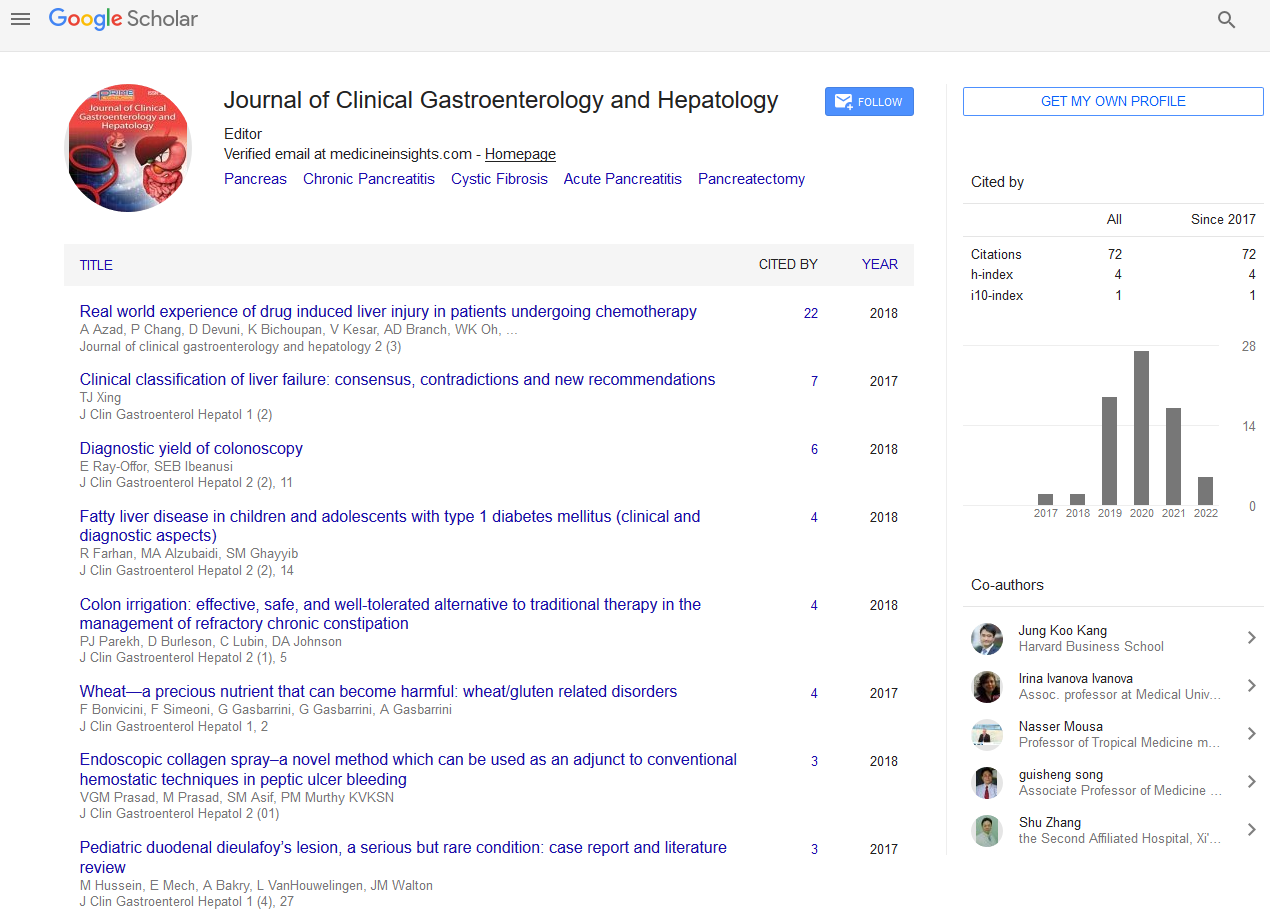Commentary - (2023) Volume 7, Issue 1
Gastrointestinal Stromal Tumor (GIST): A Cancer that Rises at the Digestive System
Michael Pardo*
Department of Oncology, Copenhagen University Hospital, Denmark
*Correspondence:
Michael Pardo,
Department of Oncology, Copenhagen University Hospital,
Denmark,
Email:
Received: 02-Jan-2023, Manuscript No. IPJCGH-23-15863;
Editor assigned: 04-Jan-2023, Pre QC No. IPJCGH-23-15863 (PQ);
Reviewed: 18-Jan-2023, QC No. IPJCGH-23-15863;
Revised: 23-Jan-2023, Manuscript No. IPJCGH-23-15863 (R);
Published:
30-Jan-2023, DOI: 10.36648/2575-7733.7.1.2
Description
GISTs, also known as digestive tract tumours, are rare malignancies
that begin in specific cells in the wall of the gastrointestinal
(GI) tract. Understanding the structure and operation
of the GI tract is helpful in understanding GISTs. A cancer form
called a Gastrointestinal Stromal Tumour (GIST) starts in the
digestive system. The stomach and small intestine are where
GISTs most frequently develop. A GIST is a cell growth that is
hypothesised to develop from a certain kind of nerve cell. The
walls of the digestive organs contain these unique nerve cells.
They contribute to how food is processed by the body.
Tiny GISTs may not show any symptoms and may develop slowly
enough so that they initially pose little threat. There may be
symptoms when a GIST develops. Among these could be stomach
ache, a growth you can feel in your stomach, drowsiness,
nausea, Vomiting, abdominal ache that worsens after eating,
Having no desire to eat when you should, If you only consume
a modest bit of food, you will feel full dark-coloured stools
brought on by gastrointestinal haemorrhage.
GISTs can occur at any age; however they are far more prevalent
in adults and extremely uncommon in children. The majority
of GISTs have an unknown cause. A small percentage is
brought on by genes that are inherited from parents. Targeted
therapy and surgery are frequently used to treat GIST. The best
therapies for you will depend on your circumstances. Certain
GISTs don’t require immediate treatment. Small GISTs without
symptoms might not require therapy. Alternatively, you might
have tests to monitor the growth of the malignancy. If your
GIST spreads, you can begin therapy.
The complete GIST is intended to be removed during surgery. For GISTs that have not progressed to other body areas, it is frequently
the first course of treatment. If your tumour becomes
exceedingly large or invades neighbouring structures, surgery
may not be necessary. If this occurs, targeted pharmacological
therapy to reduce the tumour can be your initial course of action.
Surgery could be performed later. Your cancer will determine
the kind of surgery you have. Surgeons can frequently do
minimally invasive surgery to access the GIST. Because of this,
smaller incisions in the belly are used for surgical instruments
rather than a single large one.
Targeted medication therapies concentrate on particular compounds
found in cancer cells. Targeted medication treatments
can kill cancer cells by obstructing these substances. These
medications aim to block the tyrosine kinase enzyme, which
promotes the growth of cancer cells, in GISTs. Imatinib is frequently
used to start targeted medication therapy for GISTs
(Gleevec). Targeted medication therapies can be administered
following surgery to reduce the likelihood that the cancer will
return, prior to surgery to reduce the tumor’s size and facilitate
removal, as the initial treatment if the cancer has spread to
other body areas, and if the GIST returns. If imatinib is ineffective
for you or stops working, you may be prescribed other
targeted medications. New medications are anticipated to become
available in the future because targeted drug therapy is a
hot topic in cancer research.
Acknowledgement
None.
Conflict of Interest
The authors declare no conflict of interest.
Citation: Pardo M (2023) Gastrointestinal Stromal Tumor (GIST): A Cancer that Rises at the Digestive System. J Clin Gastroenterol
Hepatol. 7:2.
Copyright: © 2023 Pardo M. This is an open-access article distributed under the terms of the Creative Commons Attribution
License, which permits unrestricted use, distribution, and reproduction in any medium, provided the original author and source
are credited.

